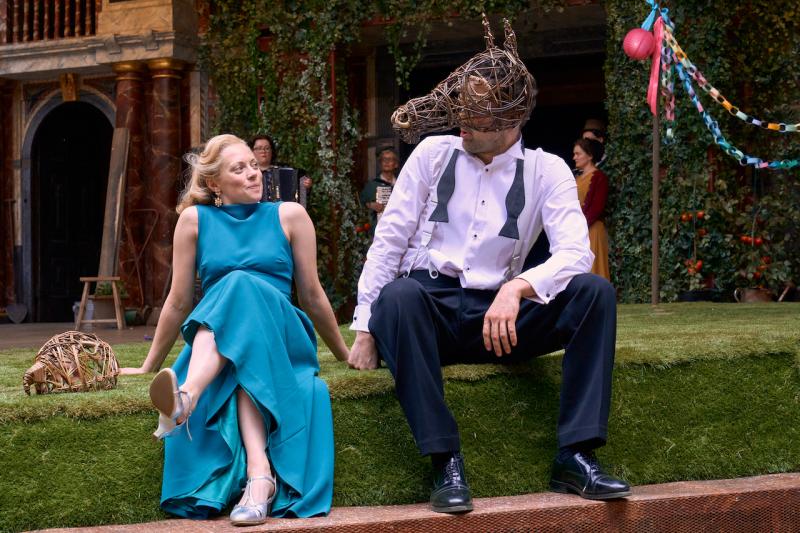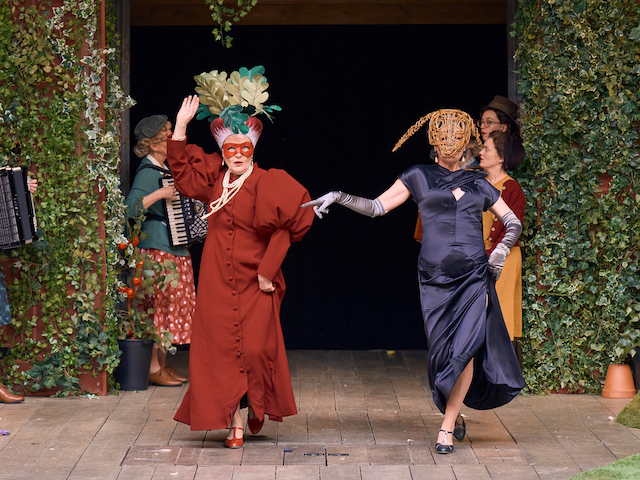Much Ado About Nothing, Shakespeare's Globe review – a perfect piece of escapism for our uncertain summer | reviews, news & interviews
Much Ado About Nothing, Shakespeare's Globe review – a perfect piece of escapism for our uncertain summer
Much Ado About Nothing, Shakespeare's Globe review – a perfect piece of escapism for our uncertain summer
This production carries as much emotional heft as it exudes riotous comedy

Lucy Bailey’s joyous, visually ravishing Much Ado About Nothing opens on a sombre note. On stage there is laughter and merriment as people prepare for a party in the sprawling grounds of an Italian estate, but then a lone soldier enters the auditorium, his head wrapped in a bandage, and the tension becomes palpable.
He is carrying a letter, and it suddenly becomes clear that the people watching his approach are all worried that it will bring news of the death of a loved one. Singing mournfully he hands the missive over; Leonata peruses it anxiously before her face lightens as she announces joyfully that the war is over, and the victorious Don Pedro and two of his soldiers are coming to stay.
It’s a brief moment which exemplifies the attention to detail that ensures this production carries as much emotional heft as it exudes riotous comedy. Much of the energy of Shakespeare’s script comes from the fact that the characters are decompressing after a war, and Bailey ensures that we do not forget this, even as we get whirled up in the absurdity. While the men arrive in soldiers’ uniform, the women – not least Katy Stephens’s savvy authoritative Leonata (pictured below right, in place of the play’s Duke Leonato) and Joanne Howarth’s gutsy Antonia (pictured below left, previously Antonio) – display a resourcefulness and caustic wit clearly heightened by the pressures of holding the home front. When Antonia chases Benedick up an ivy-clad wall with shears, you get the distinct impression that if they were not allies, Benedick could lose much more than his dignity.
The setting is North Italy in 1945 and we are here to watch two contrasting love stories play out. One is the conventional – if troubled – romance between the young brave soldier Claudio and a heroine confusingly called Hero, the other the blithely anti-romantic war of wits between Beatrice and Benedick. ‘I had rather hear my dog bark at a crow than a man swear he loves me,’ declares Lucy Phelps’ Beatrice in the first scene of her enjoyably spiky performance. Though some of her lines are a little hard to catch at the start, she picks up pace as she quite literally throws herself into the physical comedy, leading Benedick in a defiant dance for her heart.
She is more than matched by Ralph Davis’s tall funny-boned Benedick, who balances his comic bumptiousness with enough vulnerability to remain likeable. The physical absurdity of his attempts to eavesdrop on the friends who are shamelessly setting him up with Beatrice would give Chaplin a run for his money; by contrast his distress when his friend Claudio denounces Hero at the altar brings depth to the play’s final twists and turns. Throughout her career Bailey has marked herself out through her inspirational collaborations with designers and this is no exception. The key element of Joanna Parker’s lush, ivy-clad set is a grass-covered walkway that projects at an angle from the stage so that the characters can run out into the middle of the audience. While the overall impression is of an opulent Mediterranean setting, the genius of the walkway is that it makes the audience much more complicit with what’s going on. The abundant leaves provide plenty of hiding places too, not least for the doughty army of female accordion players who punctuate the action with music by Orlando Gough.
Throughout her career Bailey has marked herself out through her inspirational collaborations with designers and this is no exception. The key element of Joanna Parker’s lush, ivy-clad set is a grass-covered walkway that projects at an angle from the stage so that the characters can run out into the middle of the audience. While the overall impression is of an opulent Mediterranean setting, the genius of the walkway is that it makes the audience much more complicit with what’s going on. The abundant leaves provide plenty of hiding places too, not least for the doughty army of female accordion players who punctuate the action with music by Orlando Gough.
With scene-stealers like Beatrice and Benedick, it’s always tough to make Claudio and Hero stand out, but Patrick Osborne’s Claudio is particularly strong – not least in the scenes where he thinks he has been betrayed. In counterpoint Nadi Kemp-Sayfi evokes the bewildered outrage of a young woman caught up in events beyond her control.
Claudio’s words to her are unforgivable, yet in Osborne’s performance we feel the strain of a man who thinks he has finally found happiness after a long time in war, only to see it taken away from him. A particularly strong scene is the one in which the stage fills with mournful accordion players – at this point including some of the cast – as he looks down into what he believes is Hero’s grave.
Bailey’s Titus Andronicus was a huge success here, and with this wonderful Much Ado she proves again that she has what it takes to channel the capricious chemistry of the Globe. Visually stunning, and as musically literate as you’d expect from a director who made her name with the Gogmagogs, this production is also elevated by the fact it looks as if all the actors and musicians are having a blast. (Not least in the dances shaped by Georgina Lamb’s choreography-with-attitude).
Ferdy Roberts’ Don Pedro is both commanding and jovial, while George Fouracres is a fantastically eccentric Dogberry, both funny and unsettling, not least when it looks like he’s going to ride his bicycle offstage into the audience. In a world darkened by the shadows of real war, this emotionally nuanced and hugely funny crowd-pleaser feels like a perfect piece of escapism for our uncertain summer.
The future of Arts Journalism
You can stop theartsdesk.com closing!
We urgently need financing to survive. Our fundraising drive has thus far raised £49,000 but we need to reach £100,000 or we will be forced to close. Please contribute here: https://gofund.me/c3f6033d
And if you can forward this information to anyone who might assist, we’d be grateful.

Subscribe to theartsdesk.com
Thank you for continuing to read our work on theartsdesk.com. For unlimited access to every article in its entirety, including our archive of more than 15,000 pieces, we're asking for £5 per month or £40 per year. We feel it's a very good deal, and hope you do too.
To take a subscription now simply click here.
And if you're looking for that extra gift for a friend or family member, why not treat them to a theartsdesk.com gift subscription?
more Theatre
 The Weir, Harold Pinter Theatre review - evasive fantasy, bleak truth and possible community
Three outstanding performances in Conor McPherson’s atmospheric five-hander
The Weir, Harold Pinter Theatre review - evasive fantasy, bleak truth and possible community
Three outstanding performances in Conor McPherson’s atmospheric five-hander
 Dracula, Lyric Hammersmith review - hit-and-miss recasting of the familiar story as feminist diatribe
Morgan Lloyd Malcolm's version puts Mina Harkness centre-stage
Dracula, Lyric Hammersmith review - hit-and-miss recasting of the familiar story as feminist diatribe
Morgan Lloyd Malcolm's version puts Mina Harkness centre-stage
 The Code, Southwark Playhouse Elephant review - superbly cast, resonant play about the price of fame in Hollywood
Tracie Bennett is outstanding as a ribald, riotous Tallulah Bankhead
The Code, Southwark Playhouse Elephant review - superbly cast, resonant play about the price of fame in Hollywood
Tracie Bennett is outstanding as a ribald, riotous Tallulah Bankhead
 Reunion, Kiln Theatre review - a stormy night in every sense
Beautifully acted, but desperately grim drama
Reunion, Kiln Theatre review - a stormy night in every sense
Beautifully acted, but desperately grim drama
 The Lady from the Sea, Bridge Theatre review - flashes of brilliance
Simon Stone refashions Ibsen in his own high-octane image
The Lady from the Sea, Bridge Theatre review - flashes of brilliance
Simon Stone refashions Ibsen in his own high-octane image
 Romans: A Novel, Almeida Theatre review - a uniquely extraordinary work
Alice Birch’s wildly epic family drama is both mind-blowing and exasperating
Romans: A Novel, Almeida Theatre review - a uniquely extraordinary work
Alice Birch’s wildly epic family drama is both mind-blowing and exasperating
 The Producers, Garrick Theatre review - Ve haf vays of making you laugh
You probably know what's coming, but it's such great fun!
The Producers, Garrick Theatre review - Ve haf vays of making you laugh
You probably know what's coming, but it's such great fun!
 Not Your Superwoman, Bush Theatre review - powerful tribute to the plight and perseverance of Black women
Golda Rosheuvel and Letitia Wright excel in a super new play
Not Your Superwoman, Bush Theatre review - powerful tribute to the plight and perseverance of Black women
Golda Rosheuvel and Letitia Wright excel in a super new play
 Cow | Deer, Royal Court review - paradox-rich account of non-human life
Experimental work about nature led by Katie Mitchell is both extraordinary and banal
Cow | Deer, Royal Court review - paradox-rich account of non-human life
Experimental work about nature led by Katie Mitchell is both extraordinary and banal
 Deaf Republic, Royal Court review - beautiful images, shame about the words
Staging of Ukrainian-American Ilya Kaminsky’s anti-war poems is too meta-theatrical
Deaf Republic, Royal Court review - beautiful images, shame about the words
Staging of Ukrainian-American Ilya Kaminsky’s anti-war poems is too meta-theatrical
 Laura Benanti: Nobody Cares, Underbelly Boulevard Soho review - Tony winner makes charming, cheeky London debut
Broadway's acclaimed Cinderella, Louise, and Amalia reaches Soho for a welcome one-night stand
Laura Benanti: Nobody Cares, Underbelly Boulevard Soho review - Tony winner makes charming, cheeky London debut
Broadway's acclaimed Cinderella, Louise, and Amalia reaches Soho for a welcome one-night stand
 The Pitchfork Disney, King's Head Theatre review - blazing with dark energy
Thrilling revival of Philip Ridley’s cult classic confirms its legendary status
The Pitchfork Disney, King's Head Theatre review - blazing with dark energy
Thrilling revival of Philip Ridley’s cult classic confirms its legendary status

Add comment